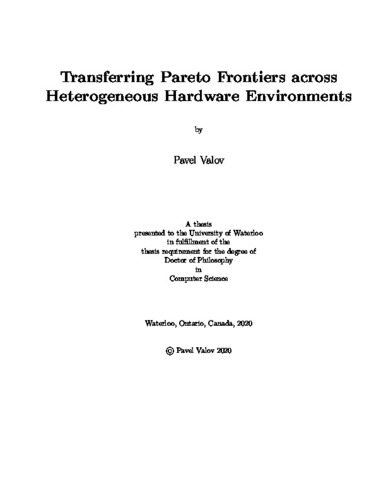| dc.contributor.author | Valov, Pavel | |
| dc.date.accessioned | 2020-09-14 18:08:51 (GMT) | |
| dc.date.available | 2020-09-14 18:08:51 (GMT) | |
| dc.date.issued | 2020-09-14 | |
| dc.date.submitted | 2020-08-05 | |
| dc.identifier.uri | http://hdl.handle.net/10012/16295 | |
| dc.description.abstract | Configurable software systems provide options that affect functional and non-functional system properties. Selection of options forms system configurations with corresponding properties values. Nowadays configurable software systems are ubiquitously used by software developers, system administrators, and end users due to their inherent adaptability. However, this flexibility comes at a cost. Configuration space exponentially explodes with addition of new options, making exhaustive system analysis impossible.
Nevertheless, many use cases require a deep understanding of a configurable system behavior, especially if the system is redeployed across heterogeneous hardware. This leads to the following research questions: (1) Is it possible to transfer configurable software property information across a collection of heterogeneous hardware? (2) Is it possible to transfer relative configurations optimality information across heterogeneous hardware?
We address the first question by proposing an approach for transferring performance prediction models of configurable systems across heterogeneous hardware. This approach builds a predictor model to approximate performance on a source hardware, and a separate transferrer model to transfer approximated performance values to a destination hardware. Experiments on three configurable software systems across 23 heterogeneous hardware environments demonstrated high accuracy (less than 10% error) for all studied combinations.
We address the second question by proposing an approach for approximation and transferring of Pareto frontiers of optimal configurations (based on multiple system properties) across heterogeneous hardware. This approach builds an individual predictor and transferrer for each analyzed system property. Using trained models, we can build an approximated Pareto frontier on a source hardware and transfer this frontier to a destination hardware. Experiments on five configurable systems across 34 heterogeneous hardware demonstrated feasibility of the approach and that the accuracy of a transferred frontier mainly depends on the approximation rather than the transferring process, while being linearly proportional to a training sample size. | en |
| dc.language.iso | en | en |
| dc.publisher | University of Waterloo | en |
| dc.subject | configurable software | en |
| dc.subject | performance prediction | en |
| dc.subject | Pareto frontier | en |
| dc.subject | regression trees | en |
| dc.subject | linear regression | en |
| dc.subject | model transferring | en |
| dc.subject | Pareto frontier approximation | en |
| dc.subject | Pareto frontier transferring | en |
| dc.title | Transferring Pareto Frontiers across Heterogeneous Hardware Environments | en |
| dc.type | Doctoral Thesis | en |
| dc.pending | false | |
| uws-etd.degree.department | David R. Cheriton School of Computer Science | en |
| uws-etd.degree.discipline | Computer Science | en |
| uws-etd.degree.grantor | University of Waterloo | en |
| uws-etd.degree | Doctor of Philosophy | en |
| uws.contributor.advisor | Czarnecki, Krzysztof | |
| uws.contributor.affiliation1 | Faculty of Mathematics | en |
| uws.published.city | Waterloo | en |
| uws.published.country | Canada | en |
| uws.published.province | Ontario | en |
| uws.typeOfResource | Text | en |
| uws.peerReviewStatus | Unreviewed | en |
| uws.scholarLevel | Graduate | en |

